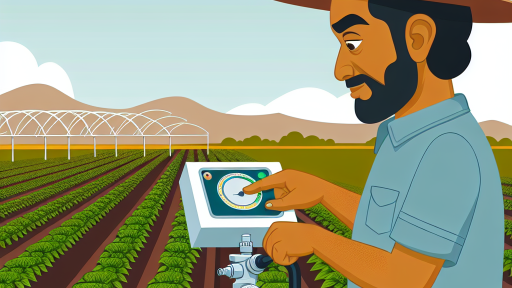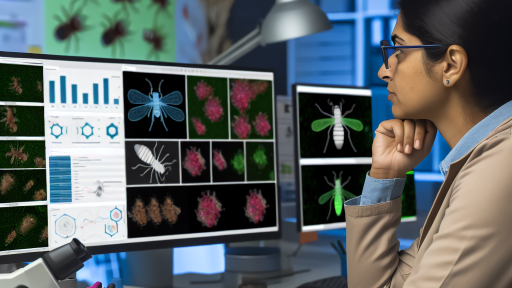An Introduction to Biotechnology in Agriculture
Biotechnology plays a critical role in modern agriculture.
Farmers use biotechnology to improve crop yields and sustainability.
This innovative approach allows for more efficient farming techniques.
Biotechnology encompasses genetic modification, fermentation, and tissue culture.
Understanding these tools is essential for today’s farmers.
Enhancing Crop Resistance
Biotechnology helps enhance crop resistance to pests and diseases.
This reduces the need for chemical pesticides.
For instance, Bt corn is engineered to resist certain insects.
This genetic modification leads to less crop loss.
Farmers benefit from reduced costs and higher yields.
Improving Nutritional Content
Another significant advantage is improving the nutritional content of crops.
Biofortification increases essential vitamins and minerals in food.
Golden rice is a prime example, enriched with vitamin A.
Such enhancements can combat malnutrition in vulnerable populations.
Consequently, farmers can address both health and economic needs.
Transform Your Agribusiness
Unlock your farm's potential with expert advice tailored to your needs. Get actionable steps that drive real results.
Get StartedBoosting Crop Productivity
Biotechnology also boosts crop productivity through better growth traits.
Researchers develop crops that grow faster and require less water.
This efficiency supports farmers in diverse climates.
Moreover, drought-resistant varieties increase food security.
Farmers can cultivate crops even in challenging environmental conditions.
Streamlining Farming Practices
Biotechnology streamlines farming practices and reduces labor efforts.
Precision agriculture integrates biotech tools for data-driven decisions.
This method utilizes genetic markers to select desirable traits.
Farmers can make informed choices about crop management strategies.
As a result, they can allocate resources more efficiently.
Facilitating Sustainable Agriculture
Biotechnology supports sustainable agriculture by minimizing resource use.
It helps reduce reliance on fertilizers and water.
For instance, nitrogen-fixing crops require less chemical fertilizer.
This promotes healthier ecosystems and enhances soil quality.
Farmers adopting these practices contribute to environmental sustainability.
The Importance of Genetic Modification in Crop Cultivation
Enhancing Crop Resilience
Genetic modification significantly boosts crop resilience to environmental stresses.
Crops engineered for drought tolerance thrive in arid conditions.
This resilience helps farmers face climate change effectively.
Moreover, pest-resistant crops reduce dependency on chemical pesticides.
Increasing Yield Potential
Genetic modifications lead to higher crop yields.
Farmers can produce more food using the same amount of land.
This increase in yield supports food security globally.
Reducing Agricultural Inputs
Genetically modified crops require fewer agricultural inputs.
Farmers can use less water and fertilizers with these crops.
Showcase Your Farming Business
Publish your professional farming services profile on our blog for a one-time fee of $200 and reach a dedicated audience of farmers and agribusiness owners.
Publish Your ProfileThis efficiency lowers production costs significantly.
Consequently, farmers increase their profitability.
Promoting Nutritional Value
Genetic modification can enhance the nutritional content of crops.
Biofortified crops provide essential vitamins and minerals.
For example, golden rice is rich in vitamin A.
Such innovations address nutrient deficiencies in vulnerable populations.
Supporting Sustainable Practices
Genetic modification supports more sustainable farming practices.
It reduces the need for land expansion into natural habitats.
This preservation of ecosystems protects biodiversity.
Consequently, sustainable practices benefit both the environment and farmers.
CRISPR Technology: Revolutionizing Crop Improvement
Introduction to CRISPR
CRISPR is a powerful tool for gene editing.
It has transformed the field of biotechnology.
This technology enables precise modifications to DNA.
It allows scientists to enhance crops efficiently.
How CRISPR Works
CRISPR uses a natural defense mechanism.
Bacteria utilize this method to protect against viruses.
Researchers harness this system for genetic editing.
Specifically, CRISPR targets and alters specific genes.
The process involves the Cas9 enzyme and RNA guide.
The RNA directs Cas9 to the target gene.
Once there, Cas9 creates a break in the DNA.
This break initiates the repair process.
During repair, scientists can introduce desired changes.
Benefits of Using CRISPR in Agriculture
CRISPR offers numerous advantages for farmers.
- Crops can be developed with improved traits.
- It enhances disease resistance significantly.
- This technology can increase yield potential.
- Additionally, crops can be developed to withstand climate stresses.
Real-World Applications
Several organizations are employing CRISPR for advancements.
For example, DuPont is working on drought-resistant corn.
Moreover, Bayer has developed disease-resistant wheat varieties.
These applications highlight the technology’s potential impact.
Challenges and Considerations
Despite its benefits, CRISPR faces challenges.
Regulatory frameworks around the world vary greatly.
Farmers must navigate these complex regulations.
Furthermore, public perception also plays a significant role.
Education and outreach efforts are crucial for acceptance.
Future of CRISPR in Crop Improvement
The future of CRISPR technology appears promising.
As research progresses, new applications will emerge.
This will further enhance food security globally.
Farmers equipped with CRISPR tools will thrive.
CRISPR represents a revolutionary step forward.
It empowers modern agriculture and addresses pressing challenges.
Learn More: Vertical Farming Technologies Driving Sustainable Urban Agriculture
Showcase Your Farming Business
Publish your professional farming services profile on our blog for a one-time fee of $200 and reach a dedicated audience of farmers and agribusiness owners.
Publish Your ProfileUnderstanding Molecular Markers for Plant Breeding
Introduction to Molecular Markers
Molecular markers serve as critical tools in plant breeding.
They help scientists track specific genes associated with desirable traits.
Moreover, they enhance the accuracy of plant selection processes.
Types of Molecular Markers
Several types of molecular markers exist in plant breeding.
Each type has unique characteristics and applications.
- DNA Markers: These markers are based on variations in DNA sequences.
- RAPD (Random Amplified Polymorphic DNA): RAPD markers are quick to develop and inexpensive.
- SSR (Simple Sequence Repeat): SSR markers offer high levels of polymorphism.
- SNP (Single Nucleotide Polymorphism): SNPs provide fine-scale genetic information.
Benefits of Using Molecular Markers
Molecular markers offer numerous advantages for modern breeding techniques.
First, they improve the precision of breeding programs.
Second, they shorten the time needed for developing new varieties.
Additionally, they enable the identification of plants with desired traits at early growth stages.
Applications in Plant Breeding
Molecular markers are invaluable in various breeding applications.
They assist in the development of disease-resistant crops.
Also, markers help increase nutritional content in plants.
Furthermore, they contribute to developing crops tailored to specific environments.
Challenges in Implementing Molecular Markers
Despite their advantages, challenges exist in using molecular markers.
First, there are costs associated with marker development and analysis.
Second, a knowledge gap persists among some farmers regarding these technologies.
Moreover, the interpretation of molecular data can be complex.
The Future of Molecular Markers in Agriculture
As technology advances, the role of molecular markers will expand.
Innovations in genomics will lead to more efficient breeding programs.
Moreover, increased education and resources will help farmers embrace these tools.
Ultimately, the use of molecular markers will revolutionize plant breeding.
Discover More: Automated Machinery And Its Impact On Farm Productivity
Biopesticides and Biofertilizers: Sustainable Alternatives
Introduction to Biopesticides
Biopesticides offer a natural approach to pest management.
They reduce the reliance on synthetic chemicals in agriculture.
Farmers utilize them to control various pests and diseases.
These products come from natural materials, such as plants and microorganisms.
By using biopesticides, farmers can promote environmental health.
Types of Biopesticides
The main categories of biopesticides include microbial, biochemical, and plant-incorporated protectants.
Microbial biopesticides consist of naturally occurring microorganisms.
Biochemical biopesticides are naturally derived compounds.
Plant-incorporated protectants involve genetic modifications to enhance plant defenses.
Benefits of Biopesticides
Biopesticides offer several advantages for modern farmers.
They contribute to sustainable farming practices.
Moreover, they often have minimal impact on non-target species.
Using biopesticides can lead to reduced pesticide residues on crops.
Introduction to Biofertilizers
Biofertilizers are another sustainable agricultural tool.
They enhance soil fertility and plant growth through biological processes.
Farmers apply biofertilizers to improve nutrient availability.
Commonly used organisms include bacteria, fungi, and algae.
Types of Biofertilizers
Biofertilizers fall into several categories, including nitrogen-fixing, phosphate-solubilizing, and mycorrhizal fungi.
Showcase Your Farming Business
Publish your professional farming services profile on our blog for a one-time fee of $200 and reach a dedicated audience of farmers and agribusiness owners.
Publish Your ProfileNitrogen-fixing biofertilizers convert atmospheric nitrogen into usable forms for plants.
Phosphate-solubilizing biofertilizers help plants access phosphate in the soil.
Mycorrhizal fungi improve nutrient uptake and enhance plant resilience to stress.
Advantages of Biofertilizers
Biofertilizers offer numerous benefits to farmers.
They help restore soil health by increasing microbial diversity.
Additionally, biofertilizers enhance crop yield and quality.
They also reduce the need for synthetic fertilizers, lowering costs.
Integrating Biopesticides and Biofertilizers
Integrating biopesticides and biofertilizers creates synergistic effects.
This combination promotes overall crop health and productivity.
Farmers can develop a resilient agricultural system through this integration.
Together, these tools support sustainable development in agriculture.
Gain More Insights: Wind Energy Applications to Enhance Farm Productivity

Tissue Culture Techniques for Crop Propagation
Basics of Tissue Culture
Tissue culture is a powerful technique for plant propagation.
This method involves growing plant cells or tissues in controlled environments.
It allows for the rapid multiplication of plants.
Furthermore, tissue culture can produce disease-free plants.
Types of Tissue Culture Techniques
Several tissue culture techniques exist, each serving different purposes.
- Micropropagation is widely used for cloning plants.
- Callus culture helps in the regeneration of new plants.
- Cell suspension culture supports the development of specific plant tissues.
Steps in Tissue Culture Process
The tissue culture process involves several key steps.
First, choose suitable plant material.
Next, sterilize the plant material to eliminate contaminants.
Then, place the material on a nutrient medium.
Afterwards, provide a suitable environment for growth.
Finally, transfer the developed plants to soil for acclimatization.
Benefits of Tissue Culture for Farmers
Tissue culture offers many advantages for modern farmers.
- It increases plant production rates significantly.
- It allows for uniformity in crops, ensuring consistent quality.
- Additionally, it provides resistance to diseases and pests.
Challenges in Implementing Tissue Culture
Despite its advantages, tissue culture can present challenges.
Access to laboratory facilities may be limited for some farmers.
Furthermore, technical expertise is required to perform tissue culture.
Costs related to equipment and materials can be prohibitive.
Integrating Tissue Culture in Farming Practices
Integrating tissue culture into farming practices can yield significant benefits.
Ultimately, farmers can enhance productivity and sustainability.
Find Out More: Automated Machinery Streamlining Sustainable Farming Techniques
Precision Agriculture: Using Biotech Tools for Efficient Farming
Overview of Precision Agriculture
Precision agriculture optimizes field-level management regarding crop farming.
This approach uses information technology to ensure efficiency.
Moreover, farmers can analyze data to enhance productivity.
Role of Biotechnology in Precision Agriculture
Biotechnology offers innovative tools to modernize farming practices.
For instance, genetic modification enhances crops’ resilience.
This process allows plants to withstand pests and harsh conditions.
Additionally, biopesticides reduce the need for chemical pesticides.
Data-Driven Decision Making
Precision agriculture relies heavily on data collection and analysis.
Farmers utilize drones and sensors to gather real-time information.
Showcase Your Farming Business
Publish your professional farming services profile on our blog for a one-time fee of $200 and reach a dedicated audience of farmers and agribusiness owners.
Publish Your ProfileThis data helps monitor crop health and soil conditions.
As a result, farmers can make informed decisions about resource allocation.
Remote Sensing Technologies
Remote sensing technologies play a key role in precision agriculture.
These tools help measure crop health from a distance.
Farmers employ satellite imagery to assess land variability.
This information guides planting schedules and irrigation practices.
Future of Precision Agriculture
The future of precision agriculture looks promising with ongoing advancements.
New technologies will likely enhance crop yields and sustainability.
Furthermore, farmers will adopt more automated systems for efficiency.
Ultimately, biotechnology tools will transform agricultural practices.
The Role of Bioinformatics in Modern Agriculture
Understanding Bioinformatics
Bioinformatics combines biology, computer science, and information technology.
This field analyzes biological data, enabling farmers to make informed decisions.
It supports the management of crop genetics, aiding in breeding programs.
Moreover, it helps in understanding plant-pathogen interactions effectively.
Applications in Crop Improvement
Farmers use bioinformatics to identify desirable traits in crops.
This process accelerates the breeding of more resilient plants.
By utilizing genomic data, farmers can select better parent plants.
Consequently, they produce hybrids that thrive in diverse conditions.
Precision Agriculture
Bioinformatics enhances precision agriculture through data analysis.
Farmers analyze soil health and crop performance using advanced tools.
This information guides them in optimizing inputs such as water and fertilizers.
As a result, they achieve increased yields while reducing environmental impact.
Pest and Disease Management
Farmers leverage bioinformatics to monitor pests and diseases.
Predictive analytics help them identify outbreaks before they spread.
By understanding pest genomes, farmers can develop effective control strategies.
This proactive approach minimizes crop loss and ensures sustainable yields.
Collaboration and Innovation
Collaboration among scientists and farmers fosters innovation in bioinformatics.
Partnerships with universities and research institutions enhance data access.
Farmers can engage in citizen science projects to contribute data.
As a result, they play a crucial role in shaping agricultural research.
Future Prospects
The future of agriculture heavily relies on advancements in bioinformatics.
New technologies will streamline data collection and analysis processes.
Farmers will continue to adopt modern tools for better decision-making.
Ultimately, bioinformatics holds the key to sustainable farming practices.




